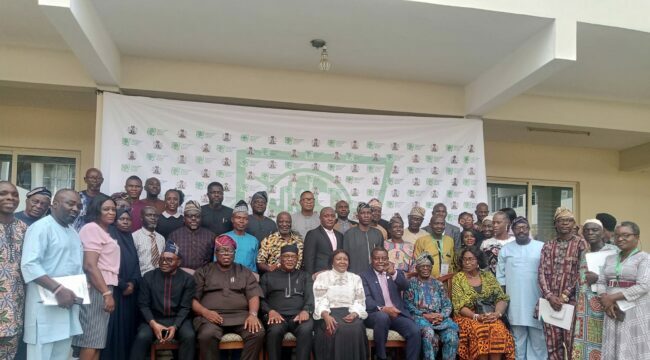Following extensive studies by its researchers, the Nigerian Institute of Social and Economic Research (NISER) has identified ways Nigerians seek a restructuring of the country.
The desires of Nigerians were presented at the NISER Policy Dialogue on “The National Restructuring Question in Nigeria,” chaired by the Director General, Nigeria Institute of International Affairs (NIIA), held on Thursday at NISER, Ibadan.
Those who presented the findings of five research reports conducted by NISER between 2018 and 2023 were NISER researchers: Dr. Hakeem Tijani, Dr. Abubakar Oladeji, and Dr. Omosefe Oyekanmi, and external resource persons: Mr. Bartholomew Fesse and Soji Apampa.
The findings indicated that a significant proportion of Nigerians, given their understanding of restructuring, advocate constitutional amendments, particularly devolution of power in the exclusive legislative list.
They, however, note that issues such as state policing, fiscal decentralisation, and autonomy on concurrent legislative lists should be prioritised for sub-national units.
The overall consensus is that restructuring is crucial for the stability and development of Nigeria and that minor incremental amendments to the 1999 Constitution are a better arrangement compared to the current state of the nation.
Nigerians identified appropriate political structure, political/economic system, and framework of governance as main issues that can facilitate sustainable national development.
Acknowledging a lack of clarity on what constitutes a national restructuring question, the reports, however, identified the argument that restructuring in Nigeria is about adjusting the rules of the political and economic games played by the elite to secure or maintain an altered distribution of benefits from available resources, rights, and status that they find acceptable.
On who leads the restructuring, the reports showed that Nigerians understand that the central government has to take the lead in providing the administrative and economic framework for the reforms.
In her remarks, the Director-General of NISER, Professor Antonia Simbine, noted that the continued call for restructuring was not unconnected with the search for workable solutions to the lingering challenges facing the nation.
In the search for solutions, she noted that there has been a proposal for a return to the 1963 Constitution.
While there is consensus about the need for restructuring in Nigeria, how to go about it is an issue. She admonished the federal government to only lean on evidence-informed research and not just on opinions and sentiments about implementing restructuring in the country.
Chairman of the occasion and NIIA DG, Professor Eghosa Osaghae, cautioned against notions that restructuring was a project that would be resolved once and for all.
He described restructuring as an ongoing process and an integral part of federalism that, from time to time, has to be rejigged and recalibrated as circumstances change.
Osaghae held that the restructuring discussion should be handled cautiously, as agitations for one thing or another will keep coming up as long as Nigeria exists.
To this end, he submitted that the emphasis should be on state reconstruction rather than restructuring.
He described political parties and the National Assembly as all part of an ongoing process of restructuring and seeking the proper functioning of a federal system.
In his input, Emeritus Professor of Political Science, John Ayoade, described the discussion about restructuring as utopian.
He bemoaned that Nigeria was an expert at making simple things complex.
Ayoade said the nation continued to panel beat its issues without addressing the main issue of a mismatch between the nation’s objectives and goals right from when it attained independence from the British.
On his part, Professor Tunji Olaopa, who is Executive Vice Chairman of the Ibadan School of Government and Public Policy, called for constitutional reengineering.
An economist, Professor Dhikru Yagboyaju, questioned states’ yearning for more resources when they are not accountable for the ones they presently get.
Yagboyaju questioned the essence of a restructuring that would not restore social order.
Analysing the subject matter, Dr Adebukola Daramola, a senior research fellow at NISER, said Nigerian leaders should become astute at managing the nation’s diversity to maintain balance.
YOU SHOULD NOT MISS THESE HEADLINES FROM NIGERIAN TRIBUNE
COP28 delegates: Invest in production, not frivolities, Peter Obi knocks Tinubu
Peter Obi, the presidential candidate of the Labour Party (LP) in the 2023 general elections has reacted to the long list of delegates that travelled with…
I studied for seven hours daily for four years — ACU best graduating student
To attain great academic success, the best-graduating student at Ajayi Crowther University for the 2022–2023 academic session, Susanna Akinteye, has…
CBN will freeze your accounts if you don’t link your BVN-NIN
The Central Bank of Nigeria (CBN) has said that all accounts without the Bank Verification Number (BVN) and…
How housewives are coping with exorbitant cost of pepper
YEJIDE GBENGA-OGUNDARE reports that in addition to significant increase in cost of food items, many Nigerian homes that…
Service chiefs on national security
SPEAKING at the Green Chamber when he led service chiefs to address parliamentarians on pertinent security issues last week, the Chief of…
Gusau outlines 2030 vision for Nigeria football development
President, Nigeria Football Federation (NFF), Ibrahim Musa Gusau, has outlined his plan for…
WATCH TOP VIDEOS FROM NIGERIAN TRIBUNE TV
- Let’s Talk About SELF-AWARENESS
- Is Your Confidence Mistaken for Pride? Let’s talk about it
- Is Etiquette About Perfection…Or Just Not Being Rude?
- Top Psychologist Reveal 3 Signs You’re Struggling With Imposter Syndrome
- Do You Pick Up Work-Related Calls at Midnight or Never? Let’s Talk About Boundaries







